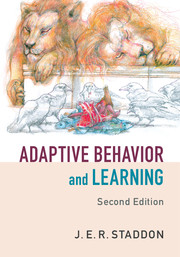Book contents
- Frontmatter
- Contents
- Preface to the second edition
- Acknowledgments
- 1 The evolution, development, and modification of behavior
- 2 Variation and selection: kineses
- 3 Reflexes
- 4 Direct orientation and feedback
- 5 Operant behavior
- 6 Reward and punishment
- 7 Feeding regulation: a model motivational system
- 8 The optimal allocation of behavior
- 9 Choice: dynamics and decision rules
- 10 Foraging and behavioral ecology
- 11 Stimulus control and cognition
- 12 Stimulus control and performance
- 13 Molar laws
- 14 Time and memory, I
- 15 Time and memory, II
- 16 Template learning
- 17 Learning, I
- 18 Models of classical conditioning
- 19 Learning, II
- 20 Learning, III: procedures
- 21 Comparative cognition
- Index
21 - Comparative cognition
Published online by Cambridge University Press: 05 March 2016
- Frontmatter
- Contents
- Preface to the second edition
- Acknowledgments
- 1 The evolution, development, and modification of behavior
- 2 Variation and selection: kineses
- 3 Reflexes
- 4 Direct orientation and feedback
- 5 Operant behavior
- 6 Reward and punishment
- 7 Feeding regulation: a model motivational system
- 8 The optimal allocation of behavior
- 9 Choice: dynamics and decision rules
- 10 Foraging and behavioral ecology
- 11 Stimulus control and cognition
- 12 Stimulus control and performance
- 13 Molar laws
- 14 Time and memory, I
- 15 Time and memory, II
- 16 Template learning
- 17 Learning, I
- 18 Models of classical conditioning
- 19 Learning, II
- 20 Learning, III: procedures
- 21 Comparative cognition
- Index
Summary
In recent years, public interest has been aroused by the exploits of smart animals – surprisingly intelligent behavior by apes, dogs, fish, and even parrots, one of whom [which?] earned an obituary in a distinguished news weekly. Much of this interest is scientific: developmental and evolutionary. Can the precursors of uniquely human behavior like language and higher cognition be discerned in animals, especially animals closely related to us? Not that close relationship is essential. Perhaps there has been convergent evolution? Octopus eyes resemble human eyes (theirs are superior in at least one respect, actually), but similar selection pressures have molded both. Aspects of bird-song development resemble some features of human language learning, as we saw in Chapter 16. But birds have only the remotest evolutionary relationship to humans. Dogs have evolved as human companions and have become uniquely sensitive to human expressions and gestures (not to mention odors!). Evolution is involved, but not common descent. Perhaps comparison with animals can help us understand the evolutionary fundamentals that lie behind all intelligence?
Another impulse that underlies research on comparative cognition is more lofty, however. The aim is to understand the animal mind, and see how close it is to the human mind. I have elsewhere labeled some of this work (perhaps unfairly) animal behavior as entertainment – or perhaps as “Dr. Dolittle research” – experiments that explore the extent to which animals can do things that previously seemed unique to people – like talk, count, form concepts, be embarrassed, feel guilty, deceive others, have a ‘theory of mind,’ or do ‘mental time travel.’ Whales give out mysterious calls that can travel many miles underwater; they stand on their heads and slap their huge tails in purposeful ways. What are they saying? Vervet monkeys emit three kinds of alarm call, depending on the type of predator they are warning about. But are they really intending to inform? Or is it just an automatic house-burglar-alarm–type system? Crows drop walnuts on a busy highway – so that they can be cracked by passing cars? Maybe. Some very ingenious experiments have been done to get at questions like this. Hard-line behaviorists find some of the work frustrating, but whatever the criticism, it surely has value as natural history, exploring the limits of what animals can be trained to do.
- Type
- Chapter
- Information
- Adaptive Behavior and Learning , pp. 563 - 578Publisher: Cambridge University PressPrint publication year: 2016



